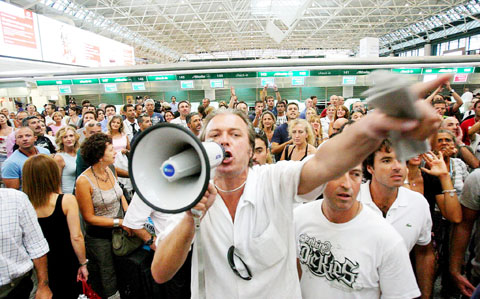Italian Prime Minister Silvio Berlusconi’s rescue plan for Alitalia was on the brink of collapse on Friday night after the consortium he put together to save the airline’s “Italian-ness” walked out of talks with unions.
Alitalia would be the first European flag-carrier to go bust since Sabena of Belgium and Swissair in 2001, and is in the hands of a bankruptcy commissioner who was due to begin liquidation proceedings on Friday.
In a desperate attempt to save the company — and to save face — the government gave the unions one more day in which to come up with their own proposal. Thousands of jobs were riding on the response.

PHOTO: EPA
On Friday night, more than 100 cabin crew staged a protest in the international check-in area at Fiumicino Airport.
The demonstrators chanted “dignity and respect” and appealed to colleagues not to board flights.
In a statement, the transport and employment ministers in Berlusconi’s right-wing government promised to avert “irreversible acts” by either the bankruptcy commissioner or the all-Italian consortium.
Employment Minister Maurizio Sacconi said, however, that “the scope for mediation has, I believe, been exhausted.”
Emma Marcegaglia, the head of Confindustria, Italy’s employers’ federation, said she had expected tough negotiations, but “it was hoped that a deadlock could be avoided.”
She was speaking after seven days of contacts between the unions and Alitalia’s would-be investors had culminated in an entire night of fruitless discussion.
A spokesman for the consortium, formed to take over the profitable parts of Alitalia, said the unions did not “appreciate the grave situation of Alitalia or the need for profound discontinuity with the past.”
The unions protested at what they claimed was a “take-it-or-leave-it” approach by putative investors.
The representative of the UIL, the most moderate of Italy’s three big trade union federations, said “we have an increasingly strong suspicion that [the consortium] wants Alitalia to collapse so as to grab it afterwards.”
Protests by the unions were strikingly reminiscent of those that drove away a bid from Air France-KLM in April. On that occasion the unions had an assurance from Berlusconi, who had just been re-elected, that a group of Italian investors was ready to buy the airline.
Though it took several months for a consortium to emerge, 19 companies and individuals expressed a readiness last month to invest in a relaunched Alitalia.
Under a plan drawn up by Intesa Sanpaolo bank, the existing firm’s vast debts would be dumped on the taxpayer.
The profitable bits of Alitalia would be hived off into a new airline that would also incorporate its main domestic competitor, Air One.
At a later stage, it was intended a foreign partner would take a stake of 20 percent to 25 percent.
The investors made it clear from the outset they envisaged a much smaller and cost-effective airline, stripped of many of its intercontinental routes. They made it clear they would only go ahead if the unions signed their business plan. That meant about 5,000 job losses and, according to the union side, pay cuts of up to 40 percent.

The Eurovision Song Contest has seen a surge in punter interest at the bookmakers, becoming a major betting event, experts said ahead of last night’s giant glamfest in Basel. “Eurovision has quietly become one of the biggest betting events of the year,” said Tomi Huttunen, senior manager of the Online Computer Finland (OCS) betting and casino platform. Betting sites have long been used to gauge which way voters might be leaning ahead of the world’s biggest televised live music event. However, bookmakers highlight a huge increase in engagement in recent years — and this year in particular. “We’ve already passed 2023’s total activity and

Nvidia Corp CEO Jensen Huang (黃仁勳) today announced that his company has selected "Beitou Shilin" in Taipei for its new Taiwan office, called Nvidia Constellation, putting an end to months of speculation. Industry sources have said that the tech giant has been eyeing the Beitou Shilin Science Park as the site of its new overseas headquarters, and speculated that the new headquarters would be built on two plots of land designated as "T17" and "T18," which span 3.89 hectares in the park. "I think it's time for us to reveal one of the largest products we've ever built," Huang said near the

BIG BUCKS: Chairman Wei is expected to receive NT$34.12 million on a proposed NT$5 cash dividend plan, while the National Development Fund would get NT$8.27 billion Taiwan Semiconductor Manufacturing Co (TSMC, 台積電), the world’s largest contract chipmaker, yesterday announced that its board of directors approved US$15.25 billion in capital appropriations for long-term expansion to meet growing demand. The funds are to be used for installing advanced technology and packaging capacity, expanding mature and specialty technology, and constructing fabs with facility systems, TSMC said in a statement. The board also approved a proposal to distribute a NT$5 cash dividend per share, based on first-quarter earnings per share of NT$13.94, it said. That surpasses the NT$4.50 dividend for the fourth quarter of last year. TSMC has said that while it is eager

China yesterday announced anti-dumping duties as high as 74.9 percent on imports of polyoxymethylene (POM) copolymers, a type of engineering plastic, from Taiwan, the US, the EU and Japan. The Chinese Ministry of Commerce’s findings conclude a probe launched in May last year, shortly after the US sharply increased tariffs on Chinese electric vehicles, computer chips and other imports. POM copolymers can partially replace metals such as copper and zinc, and have various applications, including in auto parts, electronics and medical equipment, the Chinese ministry has said. In January, it said initial investigations had determined that dumping was taking place, and implemented preliminary